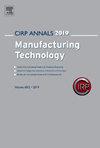Augmented geometry assurance digital twin with physics-based incremental learning
IF 3.6
3区 工程技术
Q2 ENGINEERING, INDUSTRIAL
引用次数: 0
Abstract
This paper presents a novel digital twin framework employing batch incremental learning for geometry assurance. Addressing quality issues caused by part and process variation, the method evaluates three critical tasks: part matching, locator adjustments, and joining sequence. The proposed framework utilizes deep learning architectures, each trained on recursive simulation data. Employing incremental learning, the models adapt to new batch characteristics while maintaining predictive accuracy. A spot welded assembly demonstrated the proposed approach efficiency, achieving prediction accuracies with errors as low as 0.02 mm for part matching and 0.1 mm for locator adjustments.
增强几何保证数字孪生与物理为基础的增量学习
本文提出了一种采用批量增量学习实现几何保证的新型数字孪生框架。为了解决由零件和工艺变化引起的质量问题,该方法评估了三个关键任务:零件匹配、定位器调整和连接顺序。所提出的框架利用深度学习架构,每个架构都在递归仿真数据上进行训练。采用增量学习,模型适应新的批特征,同时保持预测的准确性。点焊装配证明了该方法的有效性,零件匹配的预测精度低至0.02 mm,定位器调整的误差低至0.1 mm。
本文章由计算机程序翻译,如有差异,请以英文原文为准。
求助全文
约1分钟内获得全文
求助全文
来源期刊

Cirp Annals-Manufacturing Technology
工程技术-工程:工业
CiteScore
7.50
自引率
9.80%
发文量
137
审稿时长
13.5 months
期刊介绍:
CIRP, The International Academy for Production Engineering, was founded in 1951 to promote, by scientific research, the development of all aspects of manufacturing technology covering the optimization, control and management of processes, machines and systems.
This biannual ISI cited journal contains approximately 140 refereed technical and keynote papers. Subject areas covered include:
Assembly, Cutting, Design, Electro-Physical and Chemical Processes, Forming, Abrasive processes, Surfaces, Machines, Production Systems and Organizations, Precision Engineering and Metrology, Life-Cycle Engineering, Microsystems Technology (MST), Nanotechnology.
 求助内容:
求助内容: 应助结果提醒方式:
应助结果提醒方式:


